Borja Ibáñez, winner of the 2021 Jesús Serra Research Award, and his team at the CNIC have meticulously characterized the processes by which a common cancer drug, anthracyclines, cause cardiac toxicity. Every year, 3 million people in Europe undergo treatment with anthracyclines. One-third of these patients develop some form of cardiac toxicity, and in more than 5% of cancer survivors, the cardiac damage is irreversible, leading to chronic heart failure, a condition that significantly impacts patients’ quality of life.
The study, co-led by Borja Ibáñez, scientific director of the Centro Nacional de Investigaciones Cardiovasculares (CNIC), and published this week in the journal JACC: CardioOncology, has identified potential therapeutic targets to prevent this complication: mitochondrial function and heart metabolism.
“The heart is an organ that contracts incessantly throughout life. For this incredible activity, it needs a continuous supply of energy, and is therefore the organ with the highest energy requirements in the body. Any failure in the energy production chain in the heart has severe consequences,” says Dr. Ibáñez.
In the detailed study of the toxicity process caused by anthracyclines, the researchers discovered how these drugs alter heart metabolism. These alterations occur very early after starting treatment, and one of the first manifestations is the heart beginning to atrophy. Indeed, one possible therapy to reduce cardiac damage from anthracycline chemotherapy is a protein-rich diet for the patient during treatment, which could prevent early cardiac atrophy. In fact, Dr. Ibáñez was awarded the Occident Foundation’s clinical research prize for the study of nutritional approaches to prevent cancer treatment-related cardiotoxicity, and these results are partly the outcome of this line of research.
“We are currently progressing in a nutritional intervention study in the same experimental model, and if positive preliminary data are confirmed, it will be the seed of a future clinical trial,” emphasizes Dr. Ibáñez.
Press release from the CNIC. Read it here.

